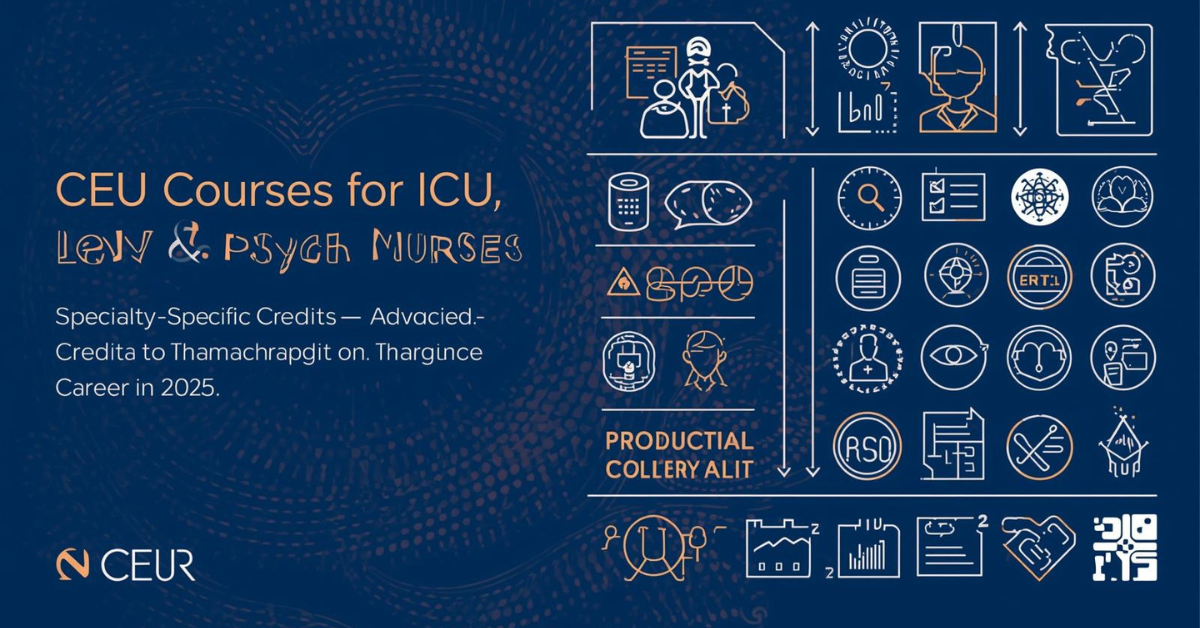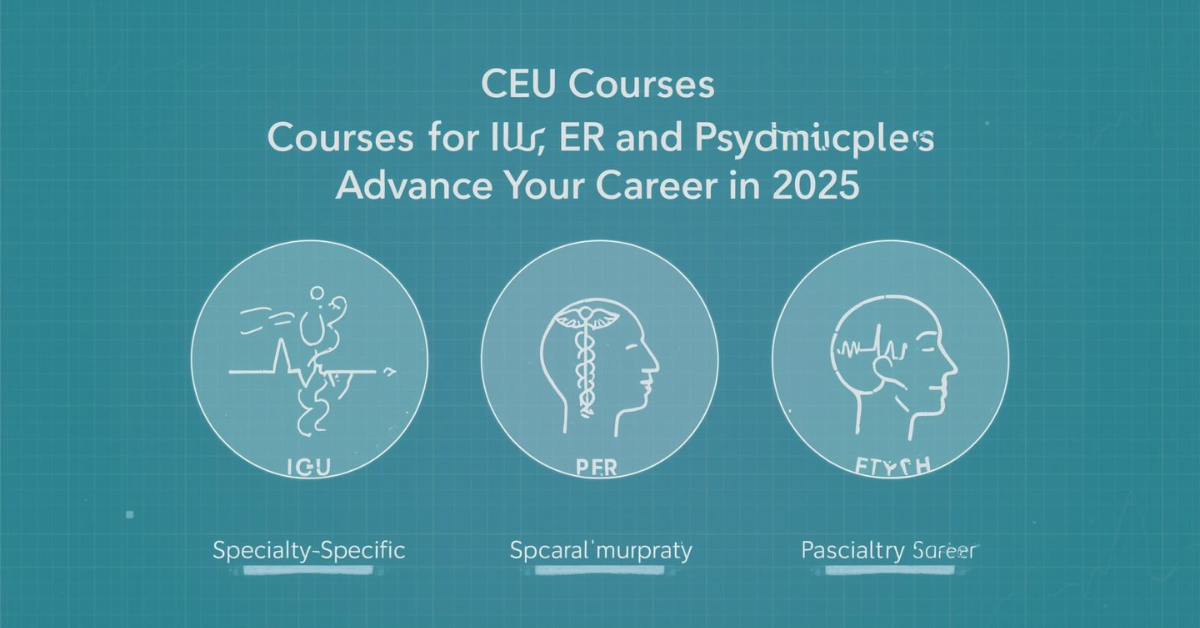What are CEU Courses for ICU, ER, and Psych Nurses — Specialty-Specific Credits to Advance Your Career in 2025. By 2025, nursing staff in intensive care, emergency, and psychiatric units will have access to continuing education courses in specialized areas such as emergency and critical care nursing, advanced pharmacology, telemedicine, and mental health and wellbeing.
Specialty-Specific Credits to Advance Your Career in 2025 — CEU Courses for ICU, ER, and Psych Nurses
Imagine this: You are three months away from license renewal and suddenly see you still need continuous education credits at 11 p.m. Worse still, the generic CEU courses you’ve bookmarked do not address the specialist abilities you truly employ in your psychiatric nursing job, in the ICU, or in the emergency room. The truth is most state boards call for 15–30 contact hours for RN license renewal, yet locating specialty-specific CEU courses that fit your daily practice might feel like looking for a pulse on a dummy. Exactly where to find accredited, excellent CEU courses created just for critical care, emergency, and psychiatric nursing practitioners is broken out in this handbook.
Among the most popular courses for all nursing staff from 2024 onward, which are expected to remain relevant, are infection prevention, geriatrics, and intercultural competence. These courses are offered live and on-demand online and can help nursing staff advance their careers.
Quick Snapshot: Specialty CEU Essentials
Online courses range from $2 to $15; live conferences cost $200 to $500 per CEU hour.
Usually 15–30 contact hours every two years (varies by state)
Best Value Options: Online packages ranging from $99–$299 for infinite yearly access
Major Specialties Covered: Updates on advanced cardiac life support; trauma nursing procedures; de-escalation methods; psychopharmacology updates
Accreditation to Look For:
Most courses, which offer immediate certificates, take 1–8 hours.
What Are Specialty-Specific CEU Courses?
You already know this fact if you work in emergency departments, psychiatric units, or intensive care: continuing education credits are not all created equal. Specialty-specific CEU programs are created around the distinctive procedures, medicines, equipment, and patient populations you meet in your specific area of nursing. Unlike traditional medical-surgical refreshes that tackle basic vital signs and wound care, these courses investigate ventilator management, quick sequence intubation, crisis intervention, or the newest standards for antipsychotic drugs. Those created by nurses who have handled your patient acuity, worked your shift, and knew what keeps you awake at night following a challenging code or violent patient incident.
Most state boards of nursing and the American Nurses Credentialing Center accept these courses for license renewal, yet the real worth goes above mere box-checking. Learning about the recent sepsis bundles your ICU just started or studying the novel restraint- reduction strategies your psych unit adopted is not only earning you credit; it is also improving the precise skills that influence patient outcomes on your next shift.
Why Specialty CEUs Matter for Your Nursing Career
Your license renewal is contingent on finishing ongoing education; your career advancement, however, depends on choosing the appropriate ongoing education. Generic courses could meet your state board, but they won’t equip you for that job interview when the nurse manager asks about your experience with ECMO patients or how you would deal with a manic patient rejecting medicine. Direct influence of specialty-specific CEU courses is your confidence in high-stakes clinical situations, salary negotiation position, and resume strength.
Particularly after negative occurrences, insurance firms and hospitals are examining nursing credentials more closely than ever. Your commitment to evidence-based practice is shown by your recent critical care CEU course completion; your knowledge of contemporary ventilator-related pneumonia prevention guidelines is questioned by a malpractice lawyer. ER nurses keeping abreast of trauma evaluations or psychiatric nurses qualified in the most recent suicide risk screening instruments are in the same vein.
From a monetary point of view, advanced credentialing and continuous specialty education are associated with increased nursing pay. While those with specialized credentials like CCRN usually demand $5,000–$10,000 more per year, critical care nurses make an average of $77,000–$95,000 annually. Salary increases are also seen by emergency department nurses holding TNCC or CEN credentials. Better job security and leadership possibilities are reported by psychiatric mental health nurses who maintain board certification through continuing education. Today’s CEU selections will help to define your future earning capacity.
Comparison Table: Top CEU Providers by Specialty
ICU/Critical Care Nurses
Best For: hemodynamic monitoring, ventilator care, CRRT updates; Accreditation: ANCC, California BRN, Florida BON; Cost: $99 yearly unlimited; Provider: RN.com Critical Care Package; Mobile Access: Yes; Instant Download; Certificate Delivery:
Best for: cardiac crises, neurological examinations, sepsis procedures; mobile accessibility; instant certificate delivery; Accreditation: ANCC, most state boards; cost: $149 per year;
Best for: Networking, schooling, preparation for the CCRN exam; gold standard; ANCC Accreditation; conference fee of $395 (30+ CEUs); Provider: AACN (American Association of Critical-Care Nurses); Mobile Access: conference app; certificate delivery within 72 hours.
ER/Emergency Nurses
Provider: Emergency Nurses Association (ENA) | Cost: $295 membership includes courses | Accreditation: ANCC, specialty-focused | Best For: Trauma nursing, triage updates, disaster preparedness | Certificate Delivery: Instant | Mobile Access: Yes
Provider: CEUfast ER Specialty Track | Cost: $59 annually | State board approved, affordable accreditation | Best suited for: quick evaluations, pediatric emergencies, overdose protocols | Certificate Delivery: Immediate | Mobile Access: Yes
Best For: Career advancement, trauma center needs; ENA-endorsed, very well known; cost: $450–$600 for certification course; Accreditation: ENA-endorsed; Certificate Delivery: Upon course completion; Mobile Access: In-person required; Provider: TNCC (Trauma Nursing Core Course)
Nurses for psychological or mental health
Best for psychopharmacology updates, borderline personality disorder, and substance abuse, provider NetCE Psychiatric Nursing Package costs $119 per year with ANCC, state board accreditation. Certificate delivery is immediate; mobile access is yes.
Provider: APNA (American Psychiatric Nurses Association) Cost: $269 membership plus course fees Accreditation: ANCC, specialty leader Best For: Trauma-informed care, de-escalation techniques, forensic nursing Certificate Delivery: Within 24 hours Mobile Access: Yes
Provider: WildIris Medical Education; Cost: $50 yearly; unrestricted; Accreditation: Multiple state approvals; Best For: Suicide Prevention, Therapeutic Communication, budget option; Immediate certificate delivery; Yes mobile access
Step-by-Step Action Plan for Choosing Your Specialty CEUs
Choosing continuing education does not always elicit as much concern as a rapid reply phone. Start by checking your specific CEU needs for license renewal on your state board of nursing website—some states like California require specified hours in pain management or infection control, whereas others accept any board-approved courses. Download your current license renewal deadline and develop a timeline backward to help you avoid frantic studies the week prior expiration.
Following that, evaluate your actual learning requirements against your adherence demands. Review your last performance review or consider the patient scenarios in which you felt most unsure in the last six months. Did you find a complicated ventilator mode challenging? Feel unsure during an angry outburst of a psychiatric patient? Your CEU options should address these knowledge gaps, not only fill hours with arbitrary topics; need to review the recent sepsis screening measures your hospital adopted.
In order to help research companies concentrate in your area, inquire of colleagues which sites they believe in and use. Many hospitals work with companies like RN.com, Relias, or HealthStream to provide free or inexpensive classes to staff; search if your healthcare system or hospital offers reduced group rates with top CEU providers. Since some courses appropriate for Texas nurses will not satisfy New York demands, confirm any provider you select is ANCC-accredited or authorized by your own state board.
Try the platform with a free course if one is available before committing to an annual subscription. Professional video quality, suitable testing format, and genuine authorship by working nurses as opposed to generic health writers must all be known by you. Look for classes updated within the last two years, especially for quickly changing subjects such critical care where guidelines very often. If the material is obsolete or the platform crashes before you can download your certificate, the least expensive choice wastes your time and money.
Lastly, create a tracking system for your completed CEUs. Keep basic spreadsheets with course titles, completion dates, contact hours earned, and provider names; save digital copies of every certificate in a different email folder or cloud storage. Your state board may audit your license renewal, and you will have to prove every CEU hour you claimed. This approach is particularly helpful when applying for specialty certification or altering your resume since you may quickly get evidence of your ongoing professional growth.
Expert Tip Box: A Nurse Educator’s Perspective
Many nurses fail to understand that specialization CEU courses might count toward eligibility for certification. Choosing CEU courses that address your certification exam material outline helps twice whether you are an ICU nurse contemplating CCRN certification or an ER nurse planning to take the CEN exam. You are simultaneously growing your knowledge base for a credential that will improve your pay and professional opportunities while meeting license renewal conditions. On AACN or ENA websites, see the certification exam content outline; then, choose CEU courses that match high-percentage exam subjects. This deliberate approach turns required education into career development.
Move Forward with Confidence in Your Specialty Practice
Speciality-specific continued education is more than just paperwork obstacles obstructing your license renewal. These classes give the evidence-based updates that distinguish excellent practice from competent practice for ICU, ER, and psychiatric nurses handling difficult, high-risk patient populations. Your CEU decisions—whether you choose cheap online channels for budget-friendly flexibility or invest in specialized organizational memberships for more networking and sophisticated content—tell patients, employers, and state boards of your professional dedication.
Usually the same ones who approach ongoing education strategically—that is, those who move into leadership roles, command greater salaries, and feel most confident during crucial patient scenarios—are also the nurses who advance into those positions. They neither settle for the simplest classes nor delay until renewal deadlines approach. Rather, they find their knowledge gaps, enroll in classes from well-known suppliers, and use fresh learning directly to their clinical practice.
Ready to begin racking up your specialty CEUs? Examine your state board requirements right now, bookmark two or three certified providers from this directory, and arrange your first course to be finished within the following two weeks. Your updated expertise helps your patients, your license stays current without last-minute stress, and your career path keeps its upward ascent.
Next: Looking for totally free possibilities? Read our guide Free CEU Courses for Nurses — Instant Certificate Downloads to find genuine no-cost continued education that yet meets state board standards.
Frequently Asked Questions about Specialty CEU Courses
Do all states accept online CEU courses for RN license renewal?
Most states welcome online continuing education courses as long as ANCC accredits or the provider is authorized by their board of nursing. Some states, meanwhile, require in-person completion of certain physical assessment or simulation courses. Before buying online courses, always confirm the particular state board standards as what serves for Florida nurses may not fulfill New York or California guidelines.
Working outside of ICU-specific specialization, could I enroll in CEU courses?
Yes, state boards generally only require that courses be from approved providers and cover nursing-related topics; they do not restrict which specialty classes you take for ordinary license renewal. If you’re thinking of a unit transfer or only want to broaden your clinical knowledge, you might study critical care and find job in psychiatric nursing. State-mandated specific topics like pain management or domestic violence, which must be finished irrespective of specialty, would be an exception.
As a specialty nurse, how much yearly should I set aside for continuing education?
Budget-conscious nurses could spend $50–$150 a year to complete all necessary continuing education credits (CEUs) using unlimited subscription services; those seeking premium material, live meetings, or specialized certification preparation could spend $300–$800 annually. Think about whether your company offers scholarships or free access to certain platforms. Should you be looking for specific certification like CCRN or CEN, budget an additional $400 to $600 for classes and test expenses unique to the credential.
What separates CEU credits from contact hours?
Technically ten contact hours equals one CEU; contact hours and CEUs are sometimes used interchangeably. Most state boards demand contact hours for RN license renewal, thus when you notice a course providing 1.5 contact hours, it translates to 0.15 CEUs. Always check whether your state board demands are specified as contact hours or CEUs to help you to prevent confusion while you track your completed courses toward renewal.
Are specialties nursing organization courses worth their higher cost relative to budget CEU suppliers?
Specialist groups like AACN, ENA, or APNA usually provide better networking opportunities and certifications appealing to companies together with higher-quality data from specialty specialists. If you are committed about career development in your area, the additional expense occasionally pays for itself via better learning outcomes and professional contacts. But if you just need to meet minimum license renewal requirements on a limited budget, approved discount providers provide legally acceptable courses at a fraction of the cost.
Read More:
https://nurseseducator.com/didactic-and-dialectic-teaching-rationale-for-team-based-learning/
https://nurseseducator.com/high-fidelity-simulation-use-in-nursing-education/
First NCLEX Exam Center In Pakistan From Lahore (Mall of Lahore) to the Global Nursing
Categories of Journals: W, X, Y and Z Category Journal In Nursing Education
AI in Healthcare Content Creation: A Double-Edged Sword and Scary
Social Links:
https://www.facebook.com/nurseseducator/
https://www.instagram.com/nurseseducator/
https://www.pinterest.com/NursesEducator/
https://www.linkedin.com/company/nurseseducator/
https://www.linkedin.com/in/nurseseducator/
https://www.researchgate.net/profile/Afza-Lal-Din
https://scholar.google.com/citations?hl=en&user=F0XY9vQAAAAJ



glad to be one of many visitors on this awe inspiring web site : D.